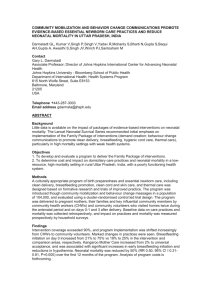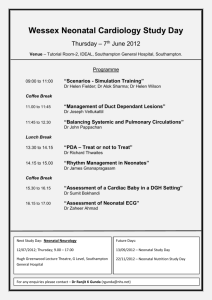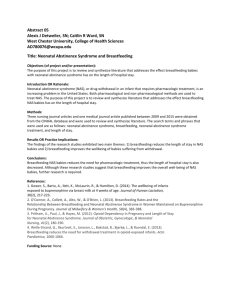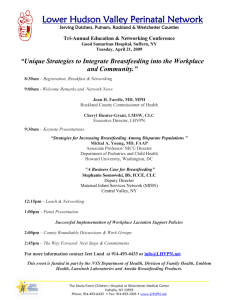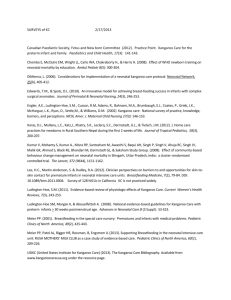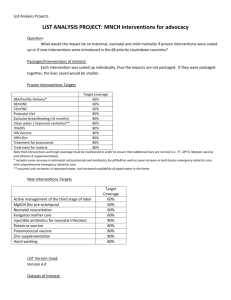Abstract (part 1) - Countdown to 2015
advertisement
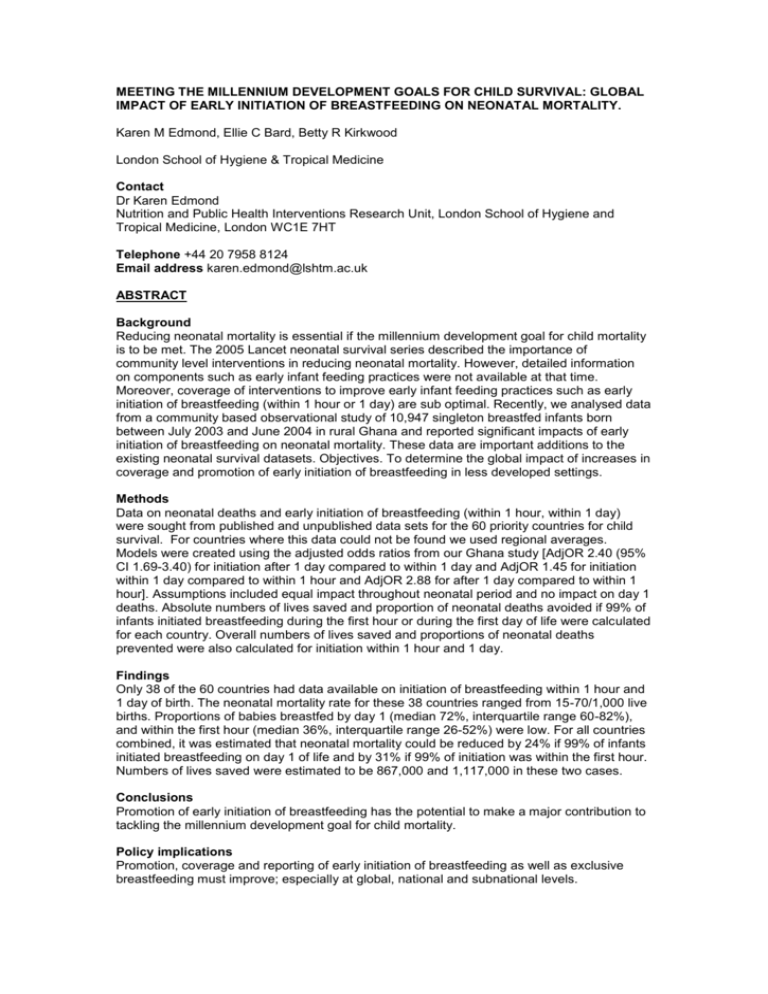
MEETING THE MILLENNIUM DEVELOPMENT GOALS FOR CHILD SURVIVAL: GLOBAL IMPACT OF EARLY INITIATION OF BREASTFEEDING ON NEONATAL MORTALITY. Karen M Edmond, Ellie C Bard, Betty R Kirkwood London School of Hygiene & Tropical Medicine Contact Dr Karen Edmond Nutrition and Public Health Interventions Research Unit, London School of Hygiene and Tropical Medicine, London WC1E 7HT Telephone +44 20 7958 8124 Email address karen.edmond@lshtm.ac.uk ABSTRACT Background Reducing neonatal mortality is essential if the millennium development goal for child mortality is to be met. The 2005 Lancet neonatal survival series described the importance of community level interventions in reducing neonatal mortality. However, detailed information on components such as early infant feeding practices were not available at that time. Moreover, coverage of interventions to improve early infant feeding practices such as early initiation of breastfeeding (within 1 hour or 1 day) are sub optimal. Recently, we analysed data from a community based observational study of 10,947 singleton breastfed infants born between July 2003 and June 2004 in rural Ghana and reported significant impacts of early initiation of breastfeeding on neonatal mortality. These data are important additions to the existing neonatal survival datasets. Objectives. To determine the global impact of increases in coverage and promotion of early initiation of breastfeeding in less developed settings. Methods Data on neonatal deaths and early initiation of breastfeeding (within 1 hour, within 1 day) were sought from published and unpublished data sets for the 60 priority countries for child survival. For countries where this data could not be found we used regional averages. Models were created using the adjusted odds ratios from our Ghana study [AdjOR 2.40 (95% CI 1.69-3.40) for initiation after 1 day compared to within 1 day and AdjOR 1.45 for initiation within 1 day compared to within 1 hour and AdjOR 2.88 for after 1 day compared to within 1 hour]. Assumptions included equal impact throughout neonatal period and no impact on day 1 deaths. Absolute numbers of lives saved and proportion of neonatal deaths avoided if 99% of infants initiated breastfeeding during the first hour or during the first day of life were calculated for each country. Overall numbers of lives saved and proportions of neonatal deaths prevented were also calculated for initiation within 1 hour and 1 day. Findings Only 38 of the 60 countries had data available on initiation of breastfeeding within 1 hour and 1 day of birth. The neonatal mortality rate for these 38 countries ranged from 15-70/1,000 live births. Proportions of babies breastfed by day 1 (median 72%, interquartile range 60-82%), and within the first hour (median 36%, interquartile range 26-52%) were low. For all countries combined, it was estimated that neonatal mortality could be reduced by 24% if 99% of infants initiated breastfeeding on day 1 of life and by 31% if 99% of initiation was within the first hour. Numbers of lives saved were estimated to be 867,000 and 1,117,000 in these two cases. Conclusions Promotion of early initiation of breastfeeding has the potential to make a major contribution to tackling the millennium development goal for child mortality. Policy implications Promotion, coverage and reporting of early initiation of breastfeeding as well as exclusive breastfeeding must improve; especially at global, national and subnational levels.

